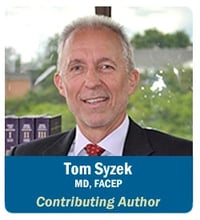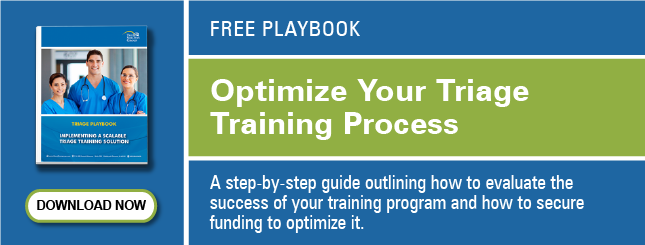 [3 MIN READ]
[3 MIN READ]
When most people think of triage, they think of nurses making sense of the chaos caused by 141 million annual visits to the ED.
Patients who are part of this massive onslaught of unscheduled care arrive daily at any hour, and the first person they see is someone in triage, usually a nurse, whose job is to quickly figure out who needs to be seen in what order.
In my early practice years, my ignorant impression was that triage was for dummies – all one had to do was just sit there and assign patients to a room.
Many years of experience and observation have taught me otherwise – that triage is where the best and brightest nurses should be.
Expert triage requires a sophisticated mix of experience, maturity, judgment, self-confidence, and leadership to get it right. Assigning the correct triage classification is a challenging task that determines the speed at which patients receive medical attention. Get it right, and lives are saved. Get it wrong, and delays in care can lead to adverse outcomes.
The best triage nurses are so good at what they do that they can discern who is really sick in the blink of an eye. On the other hand, they can also easily tell whose complaint is so minor that they could be sent elsewhere for care or even back to home (i.e., man flu) with advice to “take 2 aspirin and call somebody else in the morning.” This would save everyone time and money and reduce ED overcrowding.
Fortunately, determining that the severity of an individual’s complaint is so minor that they are advised to leave after triage is uncommon. When this scenario does occur, the specter of an EMTALA violation raises its scary head.
Why might this be an EMTALA violation? The mere fact that a patient has been accurately and rapidly triaged does not mean that the requirements of EMTALA have been met, and it is critical that all personnel involved in triage functions are aware of this.
 The Differences between Triage and EMTALA Screening
The Differences between Triage and EMTALA Screening
While both triage and EMTALA are considered screening processes, they are not the same thing.
Recall the main purpose of triage – to quickly determine the order in which patients should be seen. Triage tools employ a combination of symptoms, vital signs, and findings to determine which patient is the highest acuity as opposed to those patients who are nonurgent.
The screening process of EMTALA differs from triage in that EMTALA has specific legal requirements that a hospital must follow during the process of screening. EMTALA says that “if an individual comes to a hospital emergency department and requests examination for a medical condition, the hospital must provide an appropriate medical screening examination to determine whether an emergency medical condition exists.”
Since EMTALA is a legal requirement, every term and phrase in this sentence related to screening (i.e., “individual,” “comes to,” “medical screening examination,” “emergency medical condition”) has a specific definition.
In relation to triage, the most important phrase in the EMTALA requirement to focus on is “medical screening exam” (MSE). It’s plain and simple – triage is not the same as an MSE.
EMTALA requires that the MSE be performed by a specific person, utilizing ancillary services (lab, imaging, consultants, procedures) to determine if the patient has an emergency medical condition (EMC).
Notice the difference here – triage utilizes a specific person, but does NOT normally utilize ancillary services or determine specifically if an EMC exists.
Triage determines who should be seen in what order, whereas EMTALA requires a designated person to find out if the patient has a condition defined by law as an “emergency medical condition.”
If an EMC exists, EMTALA imposes additional requirements (stabilize, possibly transfer or accept patients), but these considerations are less relevant to the triage discussion.
It deserves mention that another aspect of potential EMTALA violation is delaying the MSE to request detailed insurance or financial information from the patient.
Summary
Triage is a skilled function that saves lives when done right. Training and performance assessments are essential components that will ensure the quality and success of a triage program.
All personnel involved in triage must also be educated to understand and accept the fact that triage itself does not satisfy the legal requirements of EMTALA.
Remember this formula to avoid EMTALA violations – triage ≠ MSE – even when you are certain that all the patient has is a common cold.
This topic, along with other triage policies, triage procedures and triage guidelines, is covered more extensively in our course - Triage Fundamentals #4.


